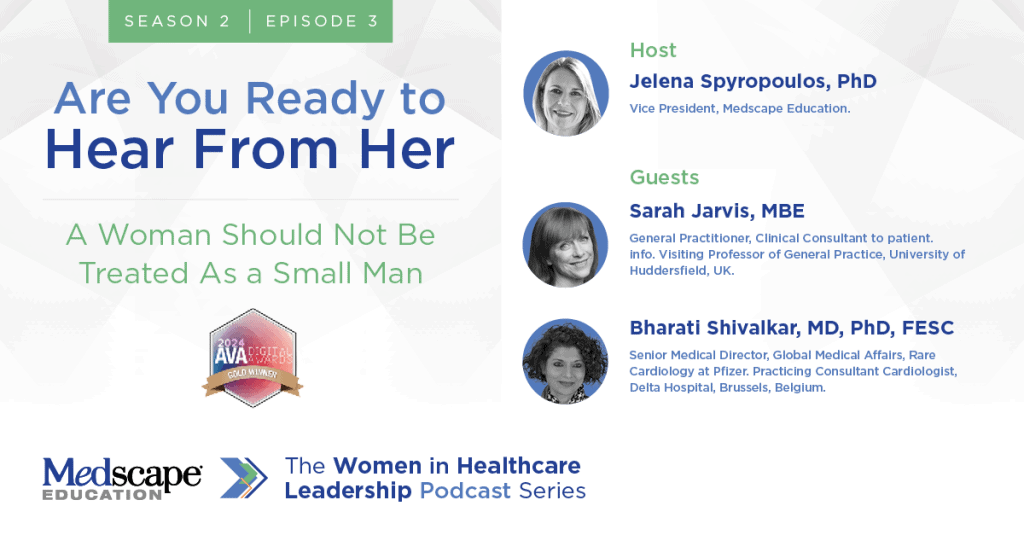A Woman Should Not Be Treated As a Small Man
April 3, 2024 | Leadership, Women in healthcare
What should the future of women’s healthcare look like? Two renowned physicians say it involves a multidisciplinary, holistic approach, where a group of different specialists work together to provide a lifetime course of holistic primary and specialty care.

Career choices are driven by many factors. In medicine, doctors are often drawn to a particular specialty following a personal experience. That is the case with Dr. Sarah Jarvis, MBE, General Practitioner, and resident doctor on BBC Radio 2.
“I decided at the age of seven or eight that I wanted to be a GP—not a doctor, but a GP!” Jarvis says, an early career decision based on her interaction with the family physician who came to the house to treat her father. “I was absolutely overawed by this almost mythical figure who came and made my daddy better. He was somebody who genuinely made a difference,” she recalls.
The mythical GP also gave the fascinated 8-year-old a needle and syringe to “play with” afterwards, says Jarvis, acknowledging that house calls and offering syringes as playthings are both unthinkable today. “I started injecting my teddy bear with [the soft drink] Ribena, and I kept the needle very carefully in a cork.” And from then on, I’ve never wavered. I went all the way through Cambridge and Oxford always wanting to be a GP” — though she kept her aspirations under her hat since the feeling was that at Cambridge and Oxford “we train professors!”
The episode’s other renowned guest, Dr. Bharati Shivalkar, Senior Medical Director for Rare Cardiology at Pfizer and Practicing Consultant Cardiologist at Delta Hospital in Brussels, Belgium, says she settled on a career in medicine somewhat later—at about age 11.
Both physicians agree that one of the (many) gaps in women’s healthcare today is around communication, and creating a safe pathway for open, honest dialog between doctors and patients.
“Communication skills are crucial,” says Jarvis. “They are not ‘soft skills.’ If I have 2 patients come to me, they may have very different priorities depending on what else is going on in their lives. If I don’t know that, and respect that, then they are much less likely to get the treatment that A), they need, and B), are likely to stick with.”
The benefits are many: fewer complications and return visits means a lightened physician workload (and hopefully reduced burnout). Helping women feel better makes their life better, and that of their families. And since many patients are of working age, it will “have a socioeconomic impact. It [has] a ripple effect on communities,” Jarvis says.
There are some exciting advances in women’s health, adds Shivalkar, including “strong movements in certain domains to create equitable, women-centered care involving a multitude of stakeholders.” The future of women’s health, both physicians believe, is a model where different specialists look at women’s issues and work together to provide a lifetime course of care that includes but extends beyond sexual and reproductive health. It’s important to understand that “many sex-specific and sex-related health issues” for example “may eventually cause cardiovascular disease, which takes a huge toll not only on the individual but society at large,” Shivalkar says.
At The World Economic Forum in Davos this year, “the importance of redesigning healthcare for women with women in mind and addressing the healthcare gap” was emphasized, says Shivalkar, largely because it is finally being recognized that it’s “going to create huge societal economic benefits. There’s talk about creating a trillion-dollar business or generating trillion-dollar businesses through improving women’s health. And recently, there’s also been more cultural investments in women’s health research.
“When you put it in terms of economics,” Shivalkar says, “you get a lot more attention.”
You won’t want to miss this conversation. Listen now via Medscape, Apple or Spotify.
Hosted by Jelena Spyropoulos, Vice President of Clinical Strategy and Sales, Medscape Education.
Follow us on LinkedIn for updates on upcoming podcasts and more insightful conversations.
For more information, please contact Jelena Spyropoulos (Global) or Piyali Shin (US).
About Medscape Education Medscape Education (medscape.org) is the leading destination for continuous professional development, consisting of more than 30 specialty-focused destinations offering thousands of free accredited CME and CE courses for physicians, nurses, and other healthcare professionals.
This content was provided by Medscape Education Global
Company Details
Latest Content from Medscape Education Global
International NASH Day 2023
Shari Dermer, PhD of Medscape Education, hosted Michael Betel, Founder and President of Fatty Liver Alliance, in an engaging conversation around the importance of NASH awareness, diagnosis, and prognosis. Listen...
Shining a Spotlight on Patient Centricity in Frankfurt for EHA
The Medscape Oncology team has made their way back from Frankfurt, Germany after another successful EHA 2023 conference. While at the event, the team interacted with conference attendees at the...
Skylines and Oncology Headlines in Chicago for ASCO 2023
ASCO 2023 was a huge success for Medscape Oncology with connections made with members and conference attendees during the event at the Medscape Oncology booth on the exhibit floor and...
Medscape Oncology and American Society of Clinical Oncology Collaborate to Offer Cancer-Specific Training to Multidisciplinary Members of the Oncology Care Team
This week Medscape Oncology announced an exciting collaboration with ASCO® which you read on the Cision PR news wire here or below:The American Society of Clinical Oncology (ASCO®), a leader at...
Elevating Nephrology Outcomes at #ERA23
Medscape is headed back to Milano, Italy for the 2023 European Renal Association conference, #ERA23.This year, the team is elevating the outcomes of recent nephrology education programs to share the story...
Medscape Education is Focusing on Patient Centricity and Education Outcomes at EHA 2023
The Medscape Education team will be on site at the 2023 EHA conference in Frankfurt, Germany to share the outcomes of recent hematology education programs and to advance the discussion on...
Shining a Spotlight on Women’s Health Education Outcomes at ACOG 2023
During the 2023 annual meeting of ACOG, Medscape highlighted the outcomes of CME/CE programs focused on improving clinicians knowledge and achieving better outcomes for patients. The outcomes were shared through...
Medscape Collaborates for Health Equity at DDW 2023
Recently, DDW 2023 took place in Chicago, IL, and Medscape was on-site with patient advocacy organizations to help educate clinicians on health equity in gastroenterology.Medscape was joined during the conference...
Real-World Impact of Continuing Medical Education on Physician Behavior in Prevention of Migraine
During the Alliance For Continuing Education in the Health Professions Industry Summit Medscape Education was awarded a Best in Class designation for its use of Real-World Outcomes to measure the impact of...
Medscape Present Outcomes of Neurology Education at AAN 2023
Medscape had education outcomes on the brain for this year’s AAN conference in Boston.During the conference, Medscape presented 5 scientific posters describing the impact of continuing medical education in migraine,...





